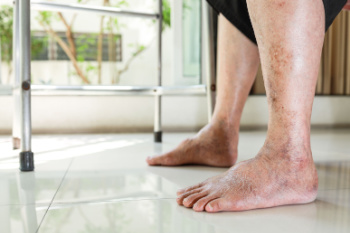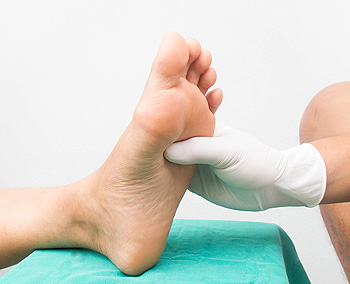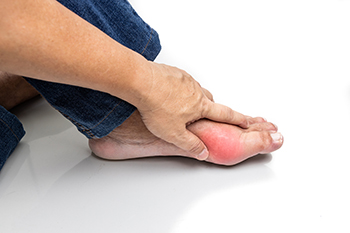Items filtered by date: July 2025
Caring for Feet Affected by Systemic Diseases

When treating foot problems in people with systemic conditions like diabetes or rheumatoid arthritis, a coordinated approach is essential. These health issues can quietly affect the feet, leading to complications such as poor circulation, nerve damage, joint deformities, or slow-healing wounds. Proper management often requires collaboration between podiatrists and other health care providers. In people with diabetes, monitoring for skin changes, numbness, and ulcers is critical, as unnoticed injuries can progress quickly. For those with rheumatoid arthritis, inflammation and joint damage can alter foot shape and function, increasing the risk of pain, instability, and skin problems. Regular foot exams, custom orthotics, and wearing appropriate footwear are often part of a long-term care plan. If you have diabetes or arthritis and are noticing changes in your feet, it is suggested you visit a podiatrist to prevent complications and protect your overall health.
When dealing with systemic disease of the feet, it is extremely important to check the affected areas routinely so that any additional problems are caught quickly. If you have any concerns about your feet and ankles contact Brock Liden, DPM from Ohio. Our doctor will assist you with all of your podiatric needs.
Systemic Diseases of the Feet
Systemic diseases affect the whole body, and symptoms usually are displayed in the feet. This condition can make a patient’s ability to walk unbearable. Systemic diseases include gout, diabetes mellitus, neurological disorders, and arthritis.
Gout – is caused by an excess of uric acid in the body. Common symptoms include pain, inflammation, and redness at the metatarsal/phalangeal joint of the base big toe. Gout can be treated by NSAIDs to relieve pain and inflammation, and other drugs that lower the acid levels in the body.
Diabetes mellitus – is an increase in the level of blood sugar that the body cannot counteract with its own insulin. Failure to produce enough insulin is a factor in Diabetes.
Diabetes of the Feet
Diabetic Neuropathy – may lead to damaged nerves and affect the feet through numbness and loss of sensation.
Peripheral Vascular Disease – can restrict the blood flow to the feet, and often times lead to amputation of the feet.
If you have any questions please feel free to contact our office located in Circleville, OH . We offer the newest diagnostic and treatment technologies for all your foot and ankle needs.
Recognizing and Treating a Fractured Foot Bone

A broken metatarsal refers to a fracture in one of the long bones in the middle of the foot. While some people may still walk on a broken metatarsal, doing so can worsen the injury and delay healing. Symptoms include pain, swelling, bruising, and difficulty bearing weight. Causes include direct trauma, falls, overuse during sports, and high-impact activities. Among the risk factors are osteoporosis, improper footwear, and intense physical activity. A podiatrist can diagnose the fracture through examination and imaging, then recommend a personalized treatment plan. This may include immobilization, rest, or, in some cases, surgery. If you suspect a broken metatarsal, do not ignore the pain. It is suggested that you seek expert podiatric care to ensure a full and safe recovery.
A broken foot requires immediate medical attention and treatment. If you need your feet checked, contact Brock Liden, DPM from Ohio. Our doctor can provide the care you need to keep you pain-free and on your feet.
Broken Foot Causes, Symptoms, and Treatment
A broken foot is caused by one of the bones in the foot typically breaking when bended, crushed, or stretched beyond its natural capabilities. Usually the location of the fracture indicates how the break occurred, whether it was through an object, fall, or any other type of injury.
Common Symptoms of Broken Feet:
- Bruising
- Pain
- Redness
- Swelling
- Blue in color
- Numbness
- Cold
- Misshapen
- Cuts
- Deformities
Those that suspect they have a broken foot shoot seek urgent medical attention where a medical professional could diagnose the severity.
Treatment for broken bones varies depending on the cause, severity and location. Some will require the use of splints, casts or crutches while others could even involve surgery to repair the broken bones. Personal care includes the use of ice and keeping the foot stabilized and elevated.
If you have any questions please feel free to contact our office located in Circleville, OH . We offer the newest diagnostic and treatment technologies for all your foot and ankle needs.
Symptoms and Risk Factors of Diabetic Neuropathy

Diabetic neuropathy often begins in the feet, where nerve damage can cause numbness, tingling, burning, or sharp pain. Some people lose all feeling in their feet, which can make injuries go unnoticed and lead to serious complications. Neuropathy is more likely to develop in people who have had diabetes for a long time or who have poor blood sugar control. Other risk factors include high blood pressure, excess weight, smoking, and complications in the eyes or kidneys. Because neuropathy in the feet may not cause symptoms right away, many people do not realize there is a problem until an ulcer forms or changes in foot shape occur. Muscle weakness from nerve damage can lead to hammertoes, bunions, or other deformities that increase pressure on the skin. A podiatrist can help by testing for signs of neuropathy, monitoring foot health, and offering treatment to prevent further damage. If you have complications from diabetes that are affecting your feet, it is suggested that you schedule an appointment with a podiatrist for a diagnosis and appropriate treatment.
Neuropathy
Neuropathy can be a potentially serious condition, especially if it is left undiagnosed. If you have any concerns that you may be experiencing nerve loss in your feet, consult with Brock Liden, DPM from Ohio. Our doctor will assess your condition and provide you with quality foot and ankle treatment for neuropathy.
What Is Neuropathy?
Neuropathy is a condition that leads to damage to the nerves in the body. Peripheral neuropathy, or neuropathy that affects your peripheral nervous system, usually occurs in the feet. Neuropathy can be triggered by a number of different causes. Such causes include diabetes, infections, cancers, disorders, and toxic substances.
Symptoms of Neuropathy Include:
- Numbness
- Sensation loss
- Prickling and tingling sensations
- Throbbing, freezing, burning pains
- Muscle weakness
Those with diabetes are at serious risk due to being unable to feel an ulcer on their feet. Diabetics usually also suffer from poor blood circulation. This can lead to the wound not healing, infections occurring, and the limb may have to be amputated.
Treatment
To treat neuropathy in the foot, podiatrists will first diagnose the cause of the neuropathy. Figuring out the underlying cause of the neuropathy will allow the podiatrist to prescribe the best treatment, whether it be caused by diabetes, toxic substance exposure, infection, etc. If the nerve has not died, then it’s possible that sensation may be able to return to the foot.
Pain medication may be issued for pain. Electrical nerve stimulation can be used to stimulate nerves. If the neuropathy is caused from pressure on the nerves, then surgery may be necessary.
If you have any questions, please feel free to contact our office located in Circleville, OH . We offer the newest diagnostic and treatment technologies for all your foot care needs.
How a Podiatrist Can Help Manage Gout

Gout is a painful type of arthritis that often begins in the big toe but can also affect other joints in the foot or ankle. It results from a buildup of uric acid crystals in the joints, which may lead to intense pain, swelling, and redness. A podiatrist can help manage gout in the feet by first confirming the diagnosis through a physical exam, and, when needed, testing fluid from the affected joint. During gout flare-ups, a podiatrist can provide targeted treatment to relieve inflammation and reduce discomfort in the affected foot or ankle. If gout becomes chronic, this type of doctor can monitor long-term joint changes and may recommend custom footwear or orthotics to reduce pressure on sensitive joints. In rare cases, surgery may be considered to remove hardened uric acid deposits, called tophi, or to repair joint damage caused by repeated attacks. If you have recurrent foot pain attributed to gout, it is suggested that you schedule an appointment with a podiatrist for help in managing this condition.
Gout is a foot condition that requires certain treatment and care. If you are seeking treatment, contact Brock Liden, DPM from Ohio. Our doctor will treat your foot and ankle needs.
What Is Gout?
Gout is a type of arthritis caused by a buildup of uric acid in the bloodstream. It often develops in the foot, especially the big toe area, although it can manifest in other parts of the body as well. Gout can make walking and standing very painful and is especially common in diabetics and the obese.
People typically get gout because of a poor diet. Genetic predisposition is also a factor. The children of parents who have had gout frequently have a chance of developing it themselves.
Gout can easily be identified by redness and inflammation of the big toe and the surrounding areas of the foot. Other symptoms include extreme fatigue, joint pain, and running high fevers. Sometimes corticosteroid drugs can be prescribed to treat gout, but the best way to combat this disease is to get more exercise and eat a better diet.
If you have any questions please feel free to contact our office located in Circleville, OH . We offer the newest diagnostic and treatment technologies for all your foot and ankle needs.
Are You Suffering From Ingrown Toenails?
Finding Relief From Morning Heel Pain

Many people experience soreness near the base of the foot, especially after waking up or standing for long periods ot time. This discomfort often results from strain in the connective tissue that helps support the arch. When this tissue becomes stressed, small tears and inflammation can develop, leading to pain with each step. It can feel sharp, aching, or deep in the heel. This issue is more likely to occur in those who walk often on hard surfaces, wear unsupportive shoes, or have foot structure concerns. Ignoring the early signs may lead to longer recovery times. Simple stretches, footwear changes, or activity adjustments can help manage the condition. If you have pain near your heel or arch, it is suggested that you schedule an appointment with a podiatrist for a proper diagnosis and more advanced treatment.
Many people suffer from bouts of heel pain. For more information, contact Brock Liden, DPM of Ohio. Our doctor can provide the care you need to keep you pain-free and on your feet.
Causes of Heel Pain
Heel pain is often associated with plantar fasciitis. The plantar fascia is a band of tissues that extends along the bottom of the foot. A rip or tear in this ligament can cause inflammation of the tissue.
Achilles tendonitis is another cause of heel pain. Inflammation of the Achilles tendon will cause pain from fractures and muscle tearing. Lack of flexibility is also another symptom.
Heel spurs are another cause of pain. When the tissues of the plantar fascia undergo a great deal of stress, it can lead to ligament separation from the heel bone, causing heel spurs.
Why Might Heel Pain Occur?
- Wearing ill-fitting shoes
- Wearing non-supportive shoes
- Weight change
- Excessive running
Treatments
Heel pain should be treated as soon as possible for immediate results. Keeping your feet in a stress-free environment will help. If you suffer from Achilles tendonitis or plantar fasciitis, applying ice will reduce the swelling. Stretching before an exercise like running will help the muscles. Using all these tips will help make heel pain a condition of the past.
If you have any questions please contact our office located in Circleville, OH . We offer the newest diagnostic and treatment technologies for all your foot and ankle needs.

